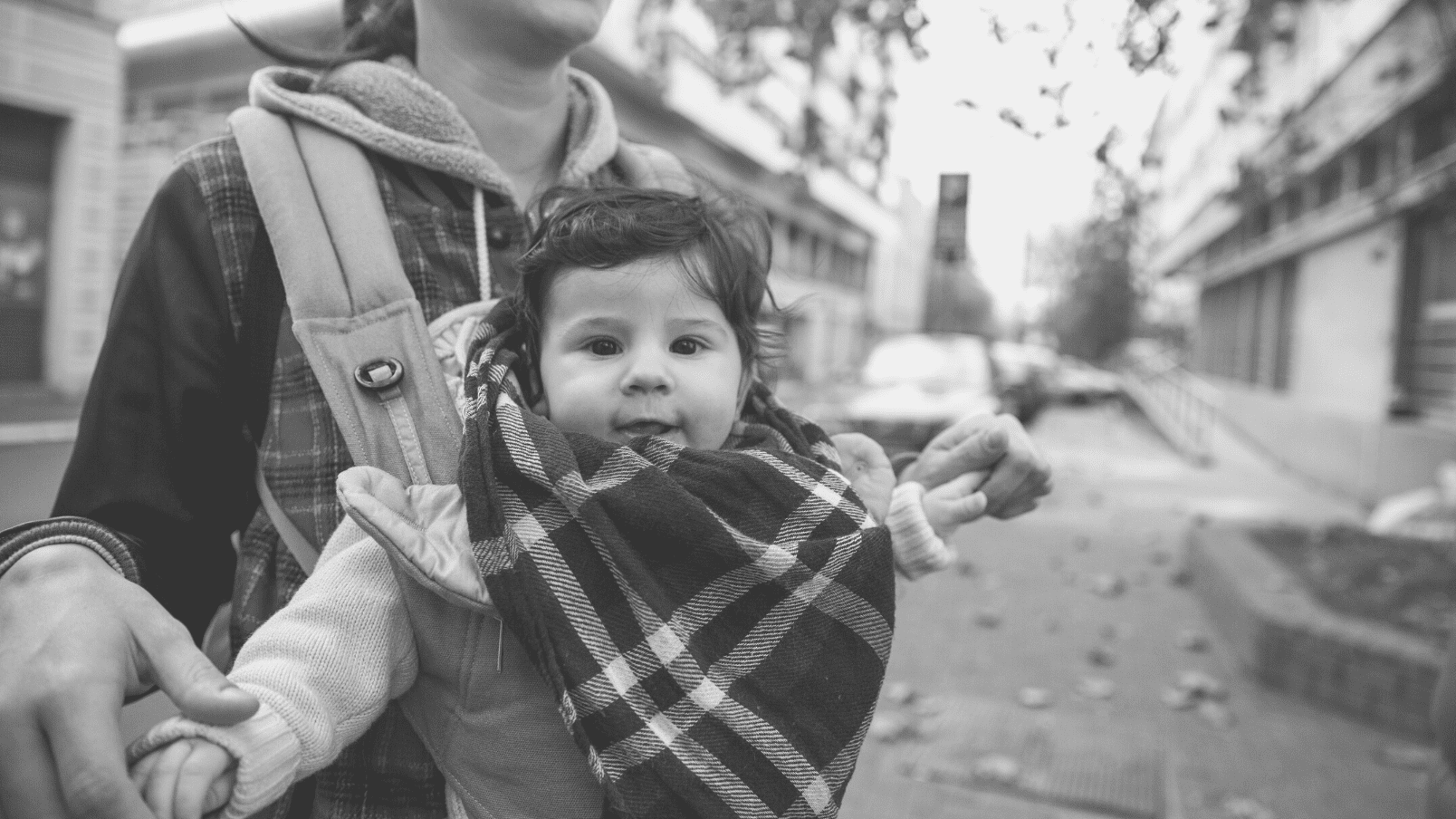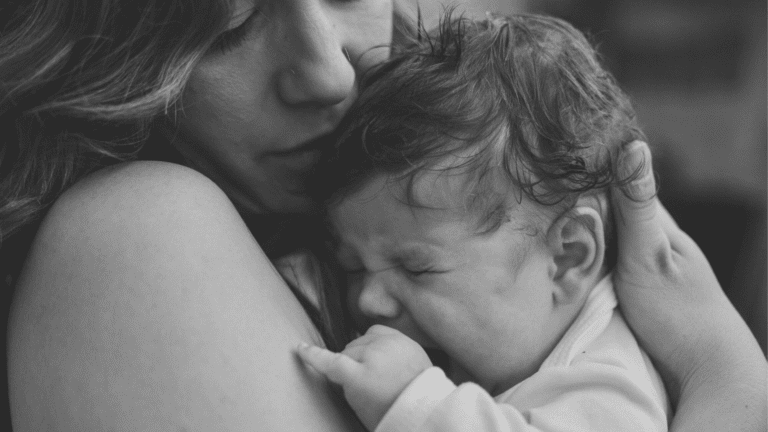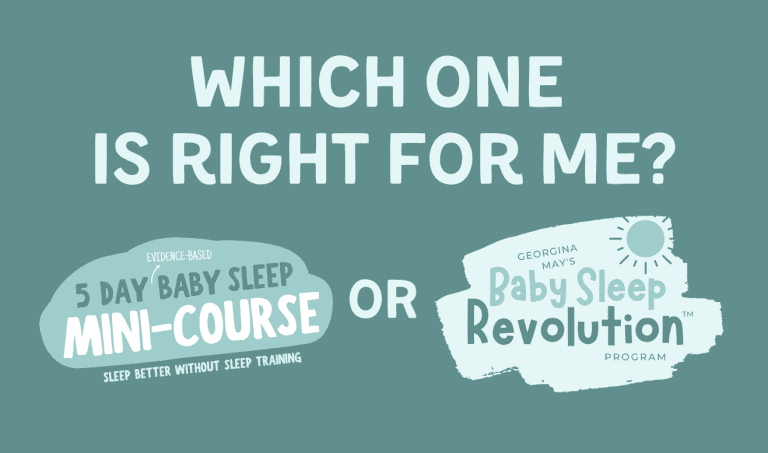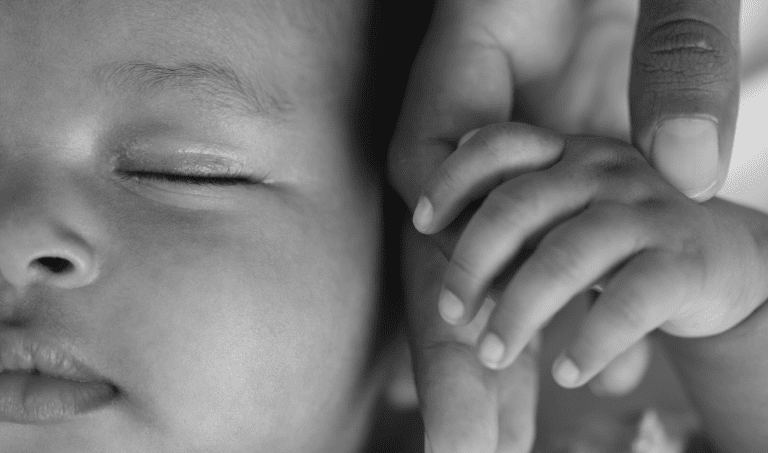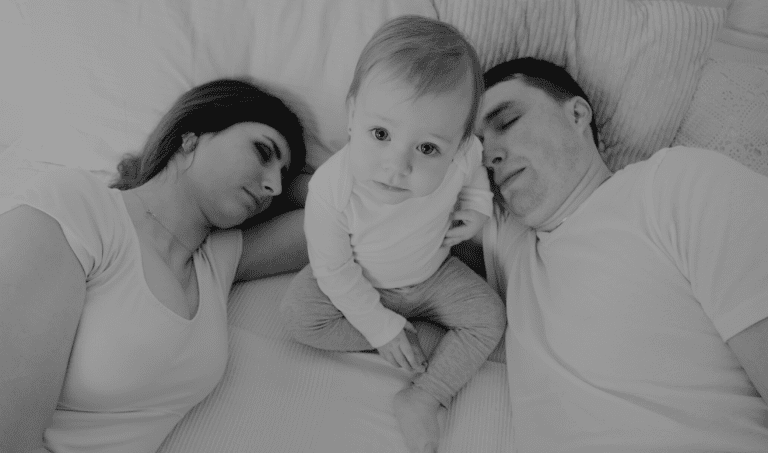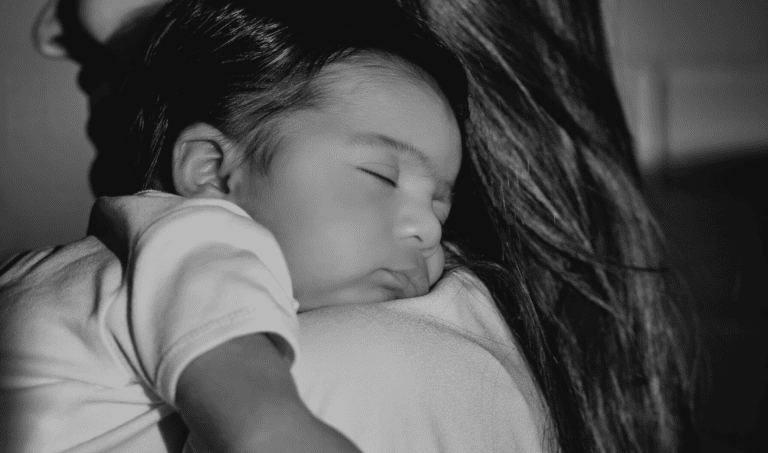If you’re reading this right now, chances are you’ve been asking one or more of these questions…
- What is a low sleep needs baby?
- How can I tell if my baby has low sleep needs?
- How can I help my low sleep needs baby or toddler sleep better?
So I’m going to do my best to answer them for you here!
What is a ‘low sleep needs’ baby?
Simply put, ‘low sleep needs’ babies and toddlers are just little ones who need less sleep than most other little ones of a similar age. They’re low down on the ‘sleep needs spectrum’.
A lot of the conventional sleep advice out there promotes the idea that all babies need a lot of sleep. But research shows there’s actually a really wide variation when it comes to how much sleep babies and toddlers need [1].
For babies aged between 4 and 11 months old, anywhere from around 9-10 hours of sleep up to around 18 hours of sleep per 24 hours (that’s naps + night sleep combined!) is usually considered ‘normal’.
And for those aged 12 months to 2 years, the range is anywhere from around 9 hours up to around 16 hours of sleep per 24 hours.
So some little ones need a lot of sleep, while others only need a few hours more than some adults! And then there are a lot who sit somewhere in the middle.
In my work as an evidence-based baby & toddler sleep educator, I focus primarily on helping parents of babies and toddlers with ‘low sleep needs’.
To date, thousands of families have been through my 5 Day Baby Sleep Mini-Course and my flagship Baby Sleep Revolution™ program and I’ve observed that most of these little ones – especially those in the Baby Sleep Revolution™ program – tend to have 12 or fewer hours sleep per 24 hours as babies, and even less as toddlers.
Sometimes it can be a little tricky to tell if a little one has low sleep needs, because they can appear – at first glance – to be sleeping more than 12 hours, on some days at least. But if they’re very wakeful at night, chances are they’re having quite fragmented sleep and/or the quality of their sleep may be affected. And some little ones can also be riding what I call a ‘sleep rollercoaster’ – having quite a lot more sleep on some days vs others. So you might be thinking: “they’re capable of sleeping 13-14 hours because they do this on some days” but that might be because on those days they’re catching up on sleep after a string of more wakeful nights. And when you look at it over a week or two, you might find the average is lower.
There are a few theories on why some little ones need a lot less sleep than others…
One is that they’re ahead of the curve when it comes to sleep development. So just like some babies walk quite a lot earlier than others, these ‘low sleep needs’ little ones need less sleep from an earlier age.
Another is that they’re wired a bit differently, which is definitely a possibility because we know genetics does influence sleep. Recently I ran a poll (not super robust but interesting all the same) with the parents in my Baby Sleep Revolution program community and 78% said that one or both of their baby’s biological parents also had low sleep needs / was prone to insomnia. If you’re interested in learning more about this, Google: ‘dolphin sleep chronotype’ – it’s very possible many of these little ones are baby ‘dolphins’!
My LO was – and still is – one of these ‘low sleep needs’ individuals and my hubby is too – so I’m blaming him for all the sleep challenges we encountered with our boy!
Whatever the reason/s, they’re a unique breed that’s for sure. Parents who don’t have a little one like this really can’t relate!
How can I tell if my baby has low sleep needs?
Full disclosure: as far as I’m aware there is very limited research in this space beyond the studies (like those I referred to above) that have measured sleep quantity in babies and toddlers.
It’s actually one of my dreams – to be able to one day fund more research in this space – but for now, we are limited to observations.
But because low sleep needs babies and toddlers have been my main focus for a number of years, I have observed common patterns of behaviour that in combination suggest a little one is likely to have ‘low sleep needs’.
Here are the most common signs I see:
⭐ They’re very alert, interested in the world or a bit of a FOMO baby
These traits seem to be very common among little ones who don’t need a lot of sleep.
Maybe it’s a case of: “Why sleep when there are soooo many other far more exciting things to do and see??”
The vast majority of parents in my Baby Sleep Revolution™ program (my program specifically for parents of low sleep needs babies & toddlers) describe their little one this way. It’s not uncommon for them to say that a midwife or a nurse at the hospital referred to their newborn as ‘alert’ or a FOMO baby within hours or days of being born!
These little ones ADORE being out and about, engaging with the world around them, especially outdoors. On the flip side, they can become quite unsettled if they’re stuck indoors for long periods of the day, especially in the same room. Boredom is a common cause of unsettledness in general for babies and toddlers – but it’s especially true for these little ones (and they won’t hold back in letting you know either!!).
⭐ They don’t nap much compared to other babies
Low sleep needs babies are often cat nappers, rarely sleeping for more than one sleep cycle at a time during the day (and often quite a bit less). This makes sense – if they don’t need a lot of sleep overall compared to other babies, then they’re probably not going to need as much nap time either.
It’s also common for many to resist sleep at nap time, take a long time to fall asleep, wake up when they’re transferred / can’t be put down at all while asleep, or need motion to stay asleep (I know I’m not the only one who’s driven their LO around in the car to keep them asleep!!).
They can usually stay awake for longer stretches too versus other babies of a similar age. This is the number one reason why I don’t promote ‘wake windows’ – they vary so much from baby to baby and can cause so much unnecessary stress for parents of little ones who don’t fit the typical ‘wake window’ guidelines. They’re also NOT evidence-based, but that’s another story!
It’s important to know that there isn’t a problem with cat-napping or short naps. There is no evidence to support the common but opinion-based idea that babies should ‘link sleep cycles’ during the day, or have a ‘2-hour nap’. The research shows quite a wide variation when it comes to naps too [1] – so if your little one isn’t napping as much as other babies, there’s almost certainly nothing to worry about (even though it means you don’t get a lot of downtime).
⭐ They’re VERY wakeful at night
By VERY wakeful I mean they:
- Wake frequently – e.g. they have false starts, or wake hourly or even more often for a period of the night; or
- Sleep lightly or restlessly – tossing & turning, or staying latched if breastfed; or
- Are wide awake for extended periods – often referred to as ‘split nights’ or middle-of-the-night (MOTN) wakings
They might be very wakeful every night, or they might be having strings of okay or good nights and then strings of very wakeful nights.
And they may have been wakeful from the get-go, or – this is the more common scenario – they suddenly became wakeful at some point during the first year, often going through a ‘sleep regression’ that they’ve really never recovered from, or struggling to get back into a manageable sleep pattern after illness or travel.
When little ones are very wakeful like this, it can be hard to work out why. But if:
- You’ve ruled out health-related causes (consult a qualified healthcare professional if you have concerns / want to investigate this).
- They’re not going through a stressful period or event (e.g. starting daycare, moving house, a change in caregivers) which can temporarily impact sleep at night.
- And they’re not struggling with separation stress – commonly referred to as ‘separation anxiety’ – which can cause wakefulness if a little one has a strong need to be close to you at night and sleeps soundly if this need is met (e.g. by safely bedsharing or sleeping within arms reach), but is very wakeful if it’s not.
Then chances are your little one’s wakefulness has come about as a result of their (low) sleep needs.
For little ones to sleep soundly at night for decent stretches, their sleep pressure (sleep drive) needs to build up to an optimal level by bedtime (they need to be tired enough). If their sleep pressure is too low when they fall asleep at bedtime, it can cause them to become very wakeful during the night.
Low sleep needs babies and toddlers seem to be much more prone to night wakefulness compared to average to high sleep needs little ones.
This is partly because they don’t need a lot of sleep – which means they need more awake time during the day / before bedtime to allow sleep pressure to build to an adequate level.
And from my observations, these little ones also seem to be wired a bit differently when it comes to sleep. They appear to struggle to self-regulate sleep as easily as other babies (are more prone to wakefulness), and often need a bit of extra help and support to ensure the nights are restful and stay that way. If you haven’t already Googled: ‘dolphin sleep chronotype’, this may explain more too.
“My baby naps really well, it’s just the nights that are bad!”
Sometimes if a little one is wakeful at night, you might find they actually nap quite a lot. This can happen if they’re in a bit of a cycle where they’re catching up on sleep during the day because they are not getting enough sleep (in terms of quantity or quality) at night.
How can I help my low sleep needs baby or toddler sleep better?
If you’ve reached this point and you’ve just been nodding along to everything you’re reading, chances are you have a ‘low sleep needs’ (LSN) little one!
The good news is – if your little one doesn’t need a lot of sleep and is very wakeful at night – there IS a light!
It is possible to improve sleep AND continue to support and respond to your baby or toddler in whatever way works best. This is what I help parents with every day!
Optimising your little one’s sleep pattern – so they fall asleep relatively easily, and sleep soundly at night (for decent stretches at a time) – really comes down to one thing:
Supporting the body’s two sleep regulators – the Circadian Rhythm and Sleep/Wake homeostasis – to ensure they’re aligned and sleep pressure is building effectively over the day, reaching an optimal level at bedtime each night.
Exactly what tweaks or changes are needed to do this will be different for every little one – because they’re all individuals, with different sleep needs and different sleep patterns.
Often it’s a case of just making a few relatively simple changes, and other times – especially if they’re very wakeful and have been for some time – you may need to follow a more specific process.
In general:
If your little one isn’t too wakeful at night (and you’re coping okay)…
Usually a few tweaks and changes will be all that’s needed to improve sleep and settling – which is exactly what my 5 Day Baby Sleep Mini-Course can help you with!
This short-but-mighty little course aims to not only help you feel a whole lot more relaxed and confident when it comes to sleep, it also teaches you how to effectively support your little one’s sleep by making evidence-based tweaks and changes.
If the nights are very wakeful and getting longer stretches at night is your #1 priority…
Then following the unique process I teach in the Baby Sleep Revolution™ (BSR) program will give you the best possible chance of getting to a much better place fast!
BSR is based on the same sleep science as the mini-course, but it goes a step further by taking you through a step-by-step process to help you to work out your little one’s optimal sleep pattern that enables sleep pressure to build to an optimal level each night so the nights are restful and predictable going forward.
Finally – an alternative to sleep training that actually works!
– Jade, Baby Sleep Revolution program
The best news?
With either option, you can continue to respond to your little one at night in whatever way works best – including feeding to sleep and (safe) bedsharing if that’s what works best for you & your little one.
There’s ZERO sleep training involved. You will NOT be required to leave your baby to cry, delay your response, or respond in a different way to what your little one naturally prefers.
Georgina x
PS – not sure which option is best for you & your situation? This should help you decide!
REFERENCES:
[1] Price, A. M., Brown, J. E., Bittman, M., Wake, M., Quach, J., & Hiscock, H. (2014). Children’s sleep patterns from 0 to 9 years: Australian population longitudinal study. Archives of disease in childhood, 99(2), 119–125. https://doi.org/10.1136/archdischild-2013-304150
AND:
Galland, B. C., Taylor, B. J., Elder, D. E., & Herbison, P. (2012). Normal sleep patterns in infants and children: a systematic review of observational studies. Sleep medicine reviews, 16(3), 213–222. https://doi.org/10.1016/j.smrv.2011.06.001


